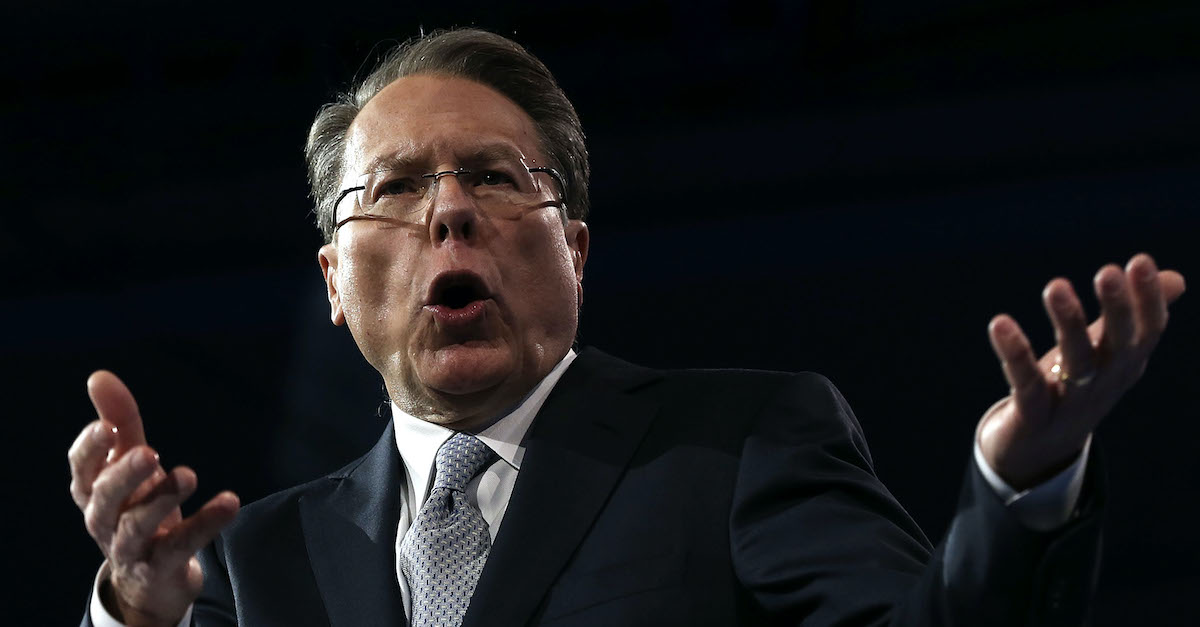
The National Rifle Association’s former chief financial officer and treasurer previously told a bankruptcy court that he tried to reform an organization under the thrall of its CEO Wayne LaPierre, who allegedly instilled an institutional culture of subordinates justifying a disregard for internal control with the words “Wayne said.”
On Friday, that ex-CFO, Craig Spray, questioned whether the NRA would fold entirely without its current leader.
“Isn’t it fair to say that the NRA could survive without LaPierre at the helm?” Assistant New York Attorney General Yael Fuchs asked Spray.
“I think it would be very challenging,” Spray replied.
Responding to that testimony, a lawyer for the NRA’s longtime public relations firm Ackerman McQueen quizzed Spray about the late French army officer and statesman Charles de Gaulle’s line about “indispensable men.”
“The cemeteries are full of them,” lawyer Mike Gruber answered his own question, paraphrasing de Gaulle’s line in a meditation on change and the arc of history.
The man at the helm of the NRA for roughly three decades, LaPierre testified for two days last week about his alleged receipt of gifts that New York regulators claim represent undisclosed conflicts of interest. The NRA chief justified his decision to voyage on Hollywood producer Stanton McKenzie’s 108-foot yacht, the Illusions, after the Sandy Hook shooting for “security” reasons, but he also acknowledged taking regular trips to the Bahamas on that vessel for years, starting in 2013.
He offered the same rationale for flying exclusively by private charter jet, and he defended his receipt of nearly $300,000 in Italian suits from a Beverly Hills Zegna, which the group’s longtime public relations Ackerman McQueen bought him for television appearances.
For Spray, the flipside of that is that LaPierre has become a key part of the NRA’s fundraising power.
“Nobody can attract dollars the way that LaPierre can,” Spray remarked.
On Jan. 29th this year, LaPierre sent the NRA’s staff and board a letter claiming that Spray resigned “due to health concerns.”
Referring to Spray’s prior testimony undermining that narrative, Fuchs quoted him telling the court: “The day of your departure was ‘certainly not the date you would have chosen’?
“Correct,” Spray responded.
The exchange highlighted a running theme in the case New York regulators have been making for a federal bankruptcy judge in Texas: that LaPierre ran the organization by fiat, retaliated against dissidents, and ousted those who, like Spray, hoped to reform the organization.
Spray testified that his pushback as the NRA’s ex-top finance officer to the group’s usual way of doing business sparked ire, including his concerns about the group’s non-profit tax records known as form 990s for the year 2019. LaPierre ultimately signed the forms himself while Spray investigated his reservations.
New York regulators appeared skeptical that the NRA’s fundraising operations amounted to a one-man shop.
“It’s a pretty large and diverse operation,” Fuchs noted, describing mail campaigns and a staff of volunteers.
“It’s not overly complex, but there is some complexity to it,” Spray replied.
When it comes to the group’s big-ticket donors, Spray said, the NRA’s fundraising sophistication becomes much simpler.
“When they come to those meetings, they come to meet with Wayne,” Spray testified.
Earlier this week, Spray testified that the NRA’s decision to file for bankruptcy blindsided him and that he was not even aware that LaPierre had created a company Sea Girt, LLC to establish jurisdiction in Texas. The NRA’s general counsel John Frazier and board member Phillip Journey, a Wichita judge, offered similar testimony. The NRA described itself as being in good financial health when LaPierre surprised its top officials with the bankruptcy gambit, which New York regulators are trying to block as a “bad faith” effort to scuttle their lawsuit seeking to shut down the organization for allegedly violating charity law.
Listen to highlights of LaPierre’s testimony last week on the Law&Crime podcast, “Objections.”